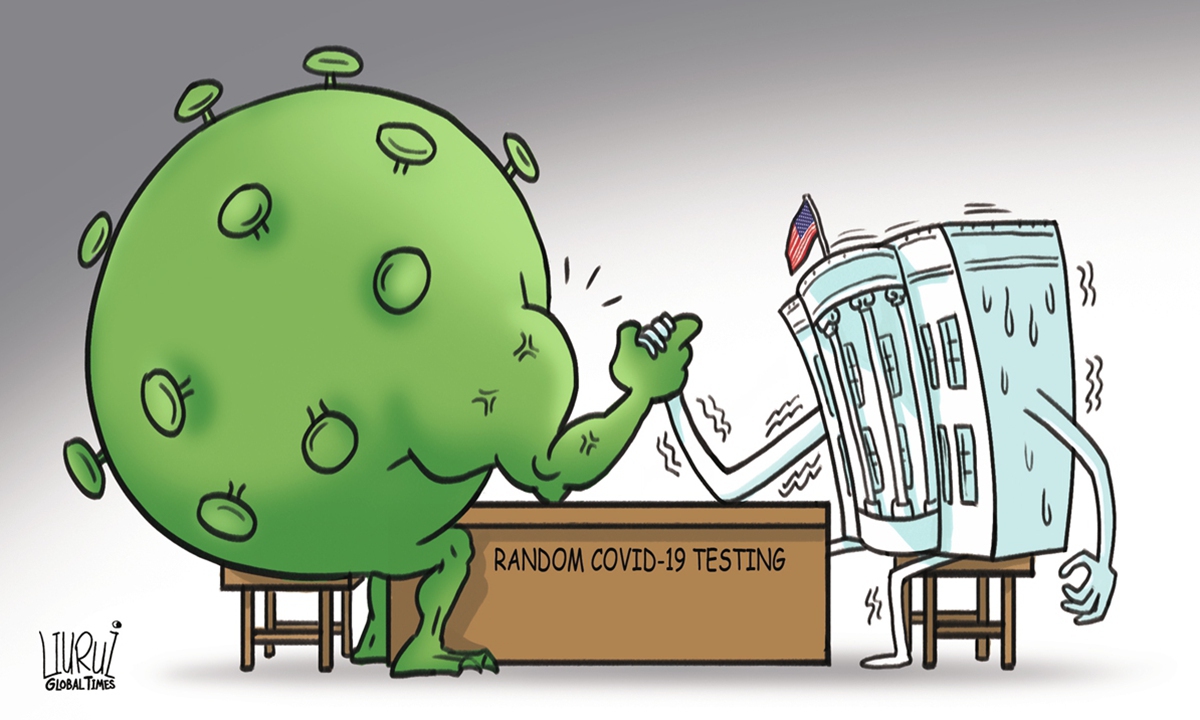COVID-19, not China, is the biggest rival of the US: Global Times editorial
Source: Global Times Published: 2020/11/9 19:03:41

Illustration: Liu Rui/GT
Declaring China a "strategic competitor" of the US has been the most salient change in the US foreign policy after US President Donald Trump took office. Incited by some advisors and aides with extreme geopolitical mind-set, Trump not only launched a trade war against China but also turned containing China into the core of US national strategy. However, the US presidential election results show that such strategies didn't offer a hand to Trump in his reelection.Trump was eventually defeated by COVID-19. From the perspective of US interests, imposing certain pressures on trade and engaging in some geopolitical competition with China might be reasonable. But clearly, the Trump administration has gone too far and thus fallen into a hysteria of confronting China.
After the COVID-19 epidemic hit the entire US, Washington's trick to use China as a scapegoat helped ease American people's discontent against their government. But the Trump administration repeatedly blamed China and the World Health Organization and made them an excuse for its ineptitude, while becoming further reluctant to take effective measures, which constantly worsened the epidemic in the US.
All these together have taught the US a grievous lesson: A big country like the US faces challenges mainly from within, and the dynamic for it to advance also comes from the proper handling of its own internal problems. Describing external factors as the largest threat to a country and thus changing the country's development logic with governance focused on such over-exaggerated external challenges might work for some time, but would eventually end up in vain.
Nationalist sentiment can be easily instigated in every country. Some countries are fond of resorting to nationalism for a solution to domestic problems. This is unwise.
In the past few years, ruling elites of the US have smeared China with various groundless accusations. They tried either to make China a cure to the US' domestic mess or fan hatred against China as a cover-up for the US administration's inabilities. Nonetheless, this trick has failed in the end.
Geopolitical competition still exists in the world, but the theme of humanity is development rather than unlimited political games. The vast majority of people are too busy to engage in the intrigue between countries.
Washington has been portraying Beijing as a demon. It wishes all countries will isolate China. But this goes against common sense and logical thinking as well as the countries' interests. They have tried hard to do so, but are cold-shouldered by many countries - they even cannot garner much support for their tricks within the US.
What is defining the China-US relationship, which is a vast cobweb of interests? The answer lies in the increasing integration of the two societies' interests that is constantly pushed forward by technological progress. But Washington has tried to change the scenario with Cold War memories, cut the benign interactions between the two countries, and use false narrative of "US victory" to deceive people. There is no proof that Washington has succeeded with such moves in the past four years.
Four years ago, Trump won in the "Rust Belt states" of Wisconsin, Michigan, and Pennsylvania. Given the logic of the US-launched trade war, Trump should have won more. But he lost all of them this year.
It is hoped that Joe Biden would handle China-US competition with a pragmatic attitude. China also attaches great importance to "US threat," but even in the hardest time, we still focus on "doing well our own business." The West often accuses China of "fanning flame of nationalism." But when have Chinese people ever used "roaring nationalism" to replace the efforts to solve their own problems?
China has never been a main problem of the US. And it can be sure that the so-called "China threat" is much weaker than the "US threat" many Chinese people are sensing. It is wrong for the US to make policies based on "China threat." If the US knows that is wrong and still does so, that would be more horrible. No matter which election year, American voters don't encourage such wrongdoing. It is hoped that the two parties in the US can thoroughly reflect on and clarify this issue.
Posted in: EDITORIAL